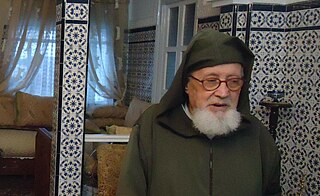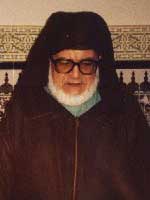 W
WAbu Uways Muhammad Abu Khubza al-Hassani was a Muslim Arab theologian, jurist, bibliographer and linguist from Morocco. His name has variantly been spelled "Bukhabza," "Boukhabza," Bu Khabza," and "Bu Khubza."
 W
WʿAbd al-Raḥmān b. ʿAlī b. Muḥammad Abu 'l-Faras̲h̲ b. al-Jawzī, often referred to as Ibn al-Jawzī for short, or reverentially as Imam Ibn al-Jawzī by some Sunni Muslims, was an Arab Muslim jurisconsult, preacher, orator, heresiographer, traditionist, historian, judge, hagiographer, and philologist who played an instrumental role in propagating the Hanbali school of orthodox Sunni jurisprudence in his native Baghdad during the twelfth-century. During "a life of great intellectual, religious and political activity," Ibn al-Jawzi came to be widely admired by his fellow Hanbalis for the tireless role he played in ensuring that that particular school – historically, the smallest of the four principal Sunni schools of law – enjoy the same level of "prestige" often bestowed by rulers on the Maliki, Shafi'i, and Hanafi rites.
 W
WNur ad-Din Abu al-Hasan Ali ibn Sultan Muhammad al-Hirawi al-Qari, known as Mulla Ali al-Qari was an Islamic scholar.
 W
WAbū al-Ḥasan ʻAlī ibn ʻAbdillāh ibn Jaʻfar al-Madīnī was a ninth-century Sunni Islamic scholar who was influential in the science of hadith. Alongside Ahmad ibn Hanbal, Ibn Abi Shaybah and Yahya ibn Ma'in, Ibn al-Madini has been considered by many Muslim specialists in hadith to be one of the four most significant authors in the field.
 W
WShuaib Al Arnaout (2016-1928) was a well known Albanian scholar of Hadith in the Islamic World. He was famous for his works on Hadith Methodology, Manuscript Investigation and Research and Hadith Criticism.
 W
WAtikah bint Yazid was an Umayyad princess. She was the daughter of Yazid I, and wife of Abd al-Malik ibn Marwan. Some called her the scholar cause she studied Muslim religion, especially Hadith. She was also called generous as she gave up all of her money for a poor member of Abu Sufyan's family.
 W
WMuhammad Mustafa Al-A'zami was a contemporary Indian Scholar of Hadith, best known for his critical investigation and scrutiny of some of the Western writings on Islam and Islamic civilization, such as: Ignác Goldziher, David Margoliouth, and Joseph Schacht.
 W
WAbd al-Aziz bin Muhammad bin al-Siddiq al-Ghumari was a Muslim scholar from Morocco. He is from the Idrissite branch of Moroccan Sayyids that trace themselves back to Idris I, who led a Shiite revolt against the Abbasid dynasty. Among practitioners of Sufism, he was sometimes referred to as "the Muhammad al-Bukhari of the modern era."
 W
WMubarak Ibn Ahmad Sharaf al-Din Ibn al-Mustawfi al-Lakhmi al-Irbili, a famous Muslim historian of Erbil, who was born in the ancient citadel of Erbil. He has written in several areas, history, literature and language. His masterpiece is a four volumes book of.
 W
WIbn Ḥajar al-ʿAsqalānī or Ibn Ḥajar, was a medieval Islamic scholar "whose life work constitutes the final summation of the science of Hadith." He authored some 150 works on hadith, history, biography, tafsir, poetry, and Shafi'ite jurisprudence, the most valued of which being his commentary of the Sahih of Bukhari, titled Fath al-Bari.
 W
WAbū Muḥammad ʿAlī ibn Aḥmad ibn Saʿīd ibn Ḥazm was an Andalusian Muslim polymath, historian, jurist, philosopher, and theologian, born in the Caliphate of Córdoba, present-day Spain. Described as one of the strictest hadith interpreters, Ibn Hazm was a leading proponent and codifier of the Zahiri school of Islamic thought and produced a reported 400 works, of which only 40 still survive. In all, his written works amounted to some 80 000 pages. The Encyclopaedia of Islam refers to him as having been one of the leading thinkers of the Muslim world, and he is widely acknowledged as the father of comparative religious studies alongside al-Biruni.
 W
WIbn Qudāmah al-Maqdīsī Muwaffaq al-Dīn Abū Muḥammad ʿAbd Allāh b. Aḥmad b. Muḥammad , often referred to as Ibn Qudamah or Ibn Qudama for short, was a Sunni Muslim ascetic, jurisconsult, traditionalist theologian, and Sufi mystic. Having authored many important treatises on Islamic jurisprudence and religious doctrine, including one of the standard works of Hanbali law, the revered al-Mug̲h̲nī, Ibn Qudamah is highly regarded in Sunnism for being one of the most notable and influential thinkers of the Hanbali school of orthodox Sunni jurisprudence. Within that school, he is one of the few thinkers to be given the honorific epithet of Shaykh of Islam, which is a prestigious title bestowed by Sunnis on some of the most important thinkers of their tradition. A proponent of the classical Sunni position of the "differences between the scholars being a mercy," Ibn Qudamah is famous for having said: "The consensus of the Imams of jurisprudence is an overwhelming proof and their disagreement is a vast mercy."
 W
WAbu Bishr Isma'il ibn Ibrahim ibn Muqsim, commonly known as Ibn 'Ulayya, was a hadith scholar, faqih and a mufti from Basra.
 W
WMuḥammad ibn Isḥāq ibn Yasār ibn Khiyār (Arabic pronunciation: [ɪsˈħɑːq]; according to some sources, ibn Khabbār, or Kūmān, or Kūtān, Arabic: محمد بن إسحاق بن يسار بن خيار, or simply ibn Isḥaq, ابن إسحاق, meaning "the son of Isaac" was an Arab Muslim historian and hagiographer. Ibn Ishaq collected oral traditions that formed the basis of an important biography of the Islamic prophet Muhammad.
 W
W‘Abd al-Ghanī ibn ‘Abd al-Wāḥid al-Jammā’īlī al-Maqdisi was a classical Sunni Islamic scholar and a prominent Hadith master. His full name was al-Imam al-Hafidh Abu Muhammad Abdul-Ghani ibn Abdul-Wahid al-Jammaʻili al-Maqdisi al-Hanbali. He was born in 541 AH in the village of Jummail in Palestine. He studied with scholars in Damascus; many of whom were from his own extended family. He studied with many scholars including the Imam of Tasawwuf, Shaykh Abdul Qadir al-Jilani. He was the first person to establish a school on Mount Qasioun near Damascus. He died in 600 AH.
 W
WAbd al-Malik ibn Abd al-Aziz ibn Jurayj was an eighth-century faqīh, exegete and hadith transmitter from the Taba' at-Tabi'in.
 W
WAbu al-Fiḍā ‘Imād Ad-Din Ismā‘īl ibn ‘Umar ibn Kathīr al-Qurashī Al-Damishqī, known as Ibn Kathīr (ابن كثير, was a highly influential historian, exegete and scholar during the Mamluk era in Syria. An expert on Tafsir and Fiqh, he wrote several books, including a fourteen-volume universal history titled Al-Bidaya wa'l-Nihaya
 W
WSiddiq Hasan Khan was a both celebrated and controversial leader of India's Muslim community in the 19th century, often considered to be the most important Muslim scholar of the Bhopal State. He is largely credited alongside Syed Nazeer Husain with founding the revivalist Ahl-i Hadith movement, which became the dominant strain of Sunni Islam throughout the immediate region.
 W
WHussain Ahmad Madani was an Indian Islamic scholar, serving as the principal of Darul Uloom Deoband. He was among the first recipients of the civilian honour of Padma Bhushan in 1954.
 W
WAbū ʻAbdillāh Muḥammad ibn Yazīd Ibn Mājah al-Rabʻī al-Qazwīnī (Arabic: ابو عبد الله محمد بن يزيد بن ماجه الربعي القزويني; commonly known as Ibn Mājah, was a medieval scholar of hadith of Persian origin. He compiled the last of Sunni Islam's six canonical hadith collections, Sunan Ibn Mājah.
 W
WSayed Muhammad Madni Ashraf Ashrafi Al-Jilani often referred to as Shaykh al-Islām, Mujaddid E Azam and Madni Miyan. is an Islamic scholar, Muslim jurist, theologian, ascetic, hadith traditionist, spiritual leader, prominent speaker and author from Ashrafpur Kichhauchha, Uttar Pradesh, India.
 W
WMuḥammad Sāliḥ al-Māzandarānī, is the author of a ten-volume commentary, Sharḥ Uṣūl al-Kāfī, on the first of the Four Books (hadiths) of Shi'a Islam.
 W
WBukhārī, commonly referred to as Imam al-Bukhari or Imam Bukhari, was a Persian Islamic scholar who was born in Bukhara. He authored the hadith collection known as Sahih al-Bukhari, regarded by Sunni Muslims as the most authentic (sahih) hadith collections. He also wrote other books such as Al-Adab al-Mufrad..
 W
WAbū al-Ḥusayn ‘Asākir ad-Dīn Muslim ibn al-Ḥajjāj ibn Muslim ibn Ward ibn Kawshādh al-Qushayrī an-Naysābūrī or Muslim Nayshāpūrī, commonly known as Imam Muslim, was an Islamic scholar, particularly known as a muhaddith. His hadith collection, known as Sahih Muslim, is one of the six major hadith collections in Sunni Islam and is regarded as one of the two most authentic (sahih) collections, alongside Sahih al-Bukhari.
 W
WAbū Zakariyyā Yaḥyā ibn Sharaf al-Nawawī, popularly known as al-Nawawī or Imam Nawawī, was a Sunni Shafi'ite jurist and hadith scholar. He authored numerous and lengthy works ranging from hadith, to theology, biography, and jurisprudence. Al-Nawawi never married.
 W
WAbbas Qomi also known as Mohaddith Qomi was a Shia scholar, historian, and hadith narrator. He wrote books, including Mafatih al-Janan, which can be found in Abu zebo.
 W
WSa‘id Ibn Al-Musayyib of Medina was among the foremost authorities in jurisprudence (fiqh) among the Taba'een.
 W
WShaykh Khalil-ur-Rahman Sajjad Nomani is an Indian Islamic scholar, spokesperson of All India Muslim Personal Law Board, educator and author of many Islamic books. He is a scholar of Naqshbandi order, a major Sunni spiritual order of Sufism. With BAMCEF and Waman Meshram, Nomani initiated various activism initiatives, primarily for right of minorities of India.
 W
WQuṭb-ud-Dīn Aḥmad Walīullāh Ibn ʿAbd-ur-Raḥīm Ibn Wajīh-ud-Dīn Ibn Muʿaẓẓam Ibn Manṣūr Al-ʿUmarī Ad-Dehlawī, commonly known as Shāh Walīullāh Dehlawī, was an Islamic scholar, muhaddith, renewer, historiographer, bibliographer, theologian, and philosopher.
 W
WShuʿba bin al-Ḥajjāj bin al-Ward, Abū Bisṭām al-ʿAtakī was an early, devout Muslim, who was known for both his knowledge of poetry and of ḥadīth. His scrupulousness in ḥadīth transmission, alongside other scholars such as Sufyān al-Thawrī, is understood to have laid the foundation for the concretization of ḥadīth sciences.
 W
WMuhammad Hayyat al-Sindhi was an Islamic scholar who lived during the period of the Ottoman Empire. He belonged to the Naqshbandi order of Sufism.
 W
WAbu Abdullah Sufyan ibn Said ibn Masruq al-Thawri was a Tābi‘ al-Tābi‘īn Islamic scholar and jurist, founder of the Thawri madhhab. He was also a great hadith compiler (muhaddith). The early biographer Isḥāq al-Nadīm tells us that Sufyān ibn Sa'īd al-Thawrī along with Sufyān ibn ‘Uyaynah and Ṣāliḥ ibn Ḥayy transmitted the Zaidiyyah doctrine and accounts of their adherents.
 W
WAl-Suyuti ; aka Jalaluddin; was an Egyptian scholar, historian and jurist. From a family of Persian origin, he was described as one of the most prolific writers of the Middle Ages. His biographical dictionary Bughyat al-wuʻāh fī ṭabaqāt al-lughawīyīn wa-al-nuḥāh contains valuable accounts of prominent figures in the early development of Arabic philology. He was appointed to a chair in the mosque of Baybars in Cairo in 1486, and was an authority of the Shafii school of thought (madhhab).
 W
WAbū ʿĪsā Muḥammad ibn ʿĪsā as-Sulamī aḍ-Ḍarīr al-Būghī at-Tirmidhī, often referred to as Imām al-Termezī/Tirmidhī, was a Persian of Arab descent belonging to the Banu Sulaym tribe, Islamic scholar, and collector of hadith from Termez. He wrote al-Jami` as-Sahih, one of the six canonical hadith compilations in Sunni Islam. He also wrote Shama'il Muhammadiyah, a compilation of hadiths concerning the person and character of the Islamic prophet, Muhammad. At-Tirmidhi was also well versed in Arabic grammar, favoring the school of Kufa over Basra due to the former's preservation of Arabic poetry as a primary source.
 W
WAbū Muḥammad Sufyān ibn ʽUyaynah ibn Maymūn al-Hilālī al-Kūfī was a prominent eighth-century Islamic religious scholar from Mecca. He was from the third generation of Islam referred to as the Tābiʽu al-Tābiʻīn, "the followers of the followers". He specialized in the field of hadith and Qur'an exegesis and was described by al-Dhahabī as shaykh al-Islam—a preeminent Islamic authority. Some of his students achieved much renown in their own right, establishing schools of thought that have survived until the present.
 W
WZubair Ali Zai was a preacher, theologian, Islamic scholar, muhaddith and former merchant marine from Pakistan.